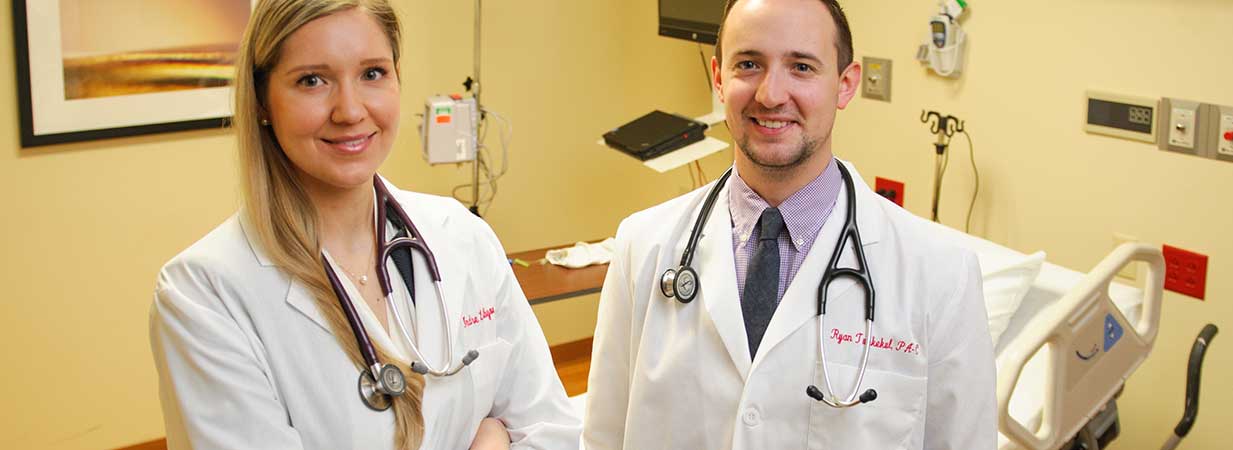
Many PAs want to continue their education but are not ready to commit to a doctoral program. Others have completed the DMSc but want to dig deeper into a particular subject matter. The Lynchburg DMSc program offers seven certificates for continuing education, described below.
 Earn up to 20 AAPA Category 1 CME credits in each certificate course and 60 credits for each certificate! By completing coursework and post-course evaluations, students can earn both their certificate and significant continuing education credit.*
Earn up to 20 AAPA Category 1 CME credits in each certificate course and 60 credits for each certificate! By completing coursework and post-course evaluations, students can earn both their certificate and significant continuing education credit.*
(*This activity has been reviewed by the AAPA Review Panel and is compliant with AAPA CME Criteria. This activity is designated for 20 AAPA Category 1 CME credits. Approval is valid from 7/1/2024 to 8/1/2025. PAs should only claim credit commensurate with the extent of their participation. AAPA reference number: CME-2011616, 2011620, 2011608, 2011617. Participant name and contact information may be reported to the AAPA to maintain activity accreditation.).
Addiction Medicine
The Addiction Medicine certificate is designed to enroll PAs working in the addiction field and those who are not. The certificate requires 15 graduate credit hours of intensive addiction medicine knowledge and skills through didactic education.
The curriculum focuses on neurobiology, neurochemistry, pharmacology, nonpharmacologic interventions, and social aspects of chemical and behavioral addictions, their contributing factors, and the future direction of Addiction Medicine. Students will further develop critical thinking involving diversity and inclusion in professional practice. The certificate is equipped to challenge students working in the addiction field and those who are not by providing a breadth and depth of knowledge and skills education in addiction medicine.
This certificate will prepare PAs to work in Addiction Medicine at the executive level and in clinical positions and demonstrate advocacy for addiction issues and policy.
- P A 951 — Overview of Addiction (3)
- P A 952 — Advanced Pharmacology and Emerging Treatments in Substance Use Disorders (3)
- P A 953 — Therapies In Addiction (3)
- P A 954 — Special Topics in Behavioral Medicine (3)
- P A 955 — Leadership Trends in Addiction (3)
Total Hours Required: 15
Behavioral Medicine
The Behavioral Medicine Certificate is designed to enroll PAs who are working in psychiatry and those who are not. The certificate requires 15 hours of doctoral education in behavioral medicine.
The curriculum focuses on neurobiology, neurochemistry, pharmacology, nonpharmacologic interventions, and psychosocial aspects of mental health and addiction disorders, their contributing factors, and the future direction of Behavioral Medicine. Students will further develop critical thinking and clinical skills, involving diversity and inclusion in professional practice. The certificate is equipped to challenge students working in the psychiatry field and those who are not by providing a breadth and depth of knowledge and skill acquisition.
This track will prepare PAs for the Psychiatry CAQ, to work in Behavioral Medicine in executive level and clinical positions, and lead in behavioral medicine.
- P A 956 — Adult Behavioral Medicine I (3)
- P A 957 — Adult Behavioral Medicine II (3)
- P A 951 — Overview of Addiction (3)
- P A 958 — Behavioral Med Across the Lifespan (3)
- P A 954 — Special Topics in Behavioral Medicine (3)
Total Hours Required: 15
Emergency and Disaster Management
Many PAs know what it means to be on the frontlines of an emergency or disaster response. While no one knows the exact details of when or how they will be called upon to respond, PAs can plan for emergencies and disasters. This certificate prepares PAs to lead with preparation and clarity during times of distress.
- P A 930 — Disaster Medicine (3)
- P A 931 — Wilderness Survival Medicine (3)
- P A 932 — Emergency and Disaster Management Principles and Practice (3)
Total Hours Required: 9
Executive Leadership
Every day, PAs are taking on more responsibility in healthcare settings and advancing their profession. This certificate prepares PAs to take a leadership role in their organization and advocate for themselves and the profession.
- P A 910 — Organizational Behavior and Leadership (3)
- P A 915 — Healthcare Management (3)
- P A 916 — Healthcare Advocacy (3)
Total Hours Required: 9
Global Health
The Global Health Certificate addresses the needs and challenges of providing medical care in under-resourced areas, to displaced refugees, and to US residents who travel internationally.
- P A 940 — Global Health Issues (3)
- P A 941 — Clinical Issues in Infectious and Tropical Disease (3)
- P A 942 — Social and Behavioral Issues in Global Health (3)
Total Hours Required: 9
Healthcare Administration and Management
The Healthcare Administration and Management certificate is for PAs who want to assume upper-level administrative positions in healthcare systems, organizations, and industry. The courses are designed to provide PA leaders with advanced training in organizational behavior, leadership, healthcare administration, and management principles.
- P A 910 — Organizational Behavior and Leadership (3)
- P A 920 — Healthcare Administration (3)
- P A 915 — Healthcare Management (3)
Total Hours Required: 9
Medical Education
The Medical Education Certificate is designed to allow clinically practicing PAs or current doctorally-educated PA faculty the option to complete doctoral level coursework designed to meet their development needs.
- P A 990 — Teaching and Learning in PA Education (3)
- P A 991 — PA Program Development, Implementation and Maintenance (3)
- P A 992 — PA Program Evaluation and Improvement (3)
or - P A 993 — Integrating Technology and Teaching Online (3)
Total Hours Required: 9
Certificate Completion
Upon successful completion of a certificate program, students who meet the requirements may apply for admission to the DMSc—Medical Education Concentration, DMSc—Emergency Management and Global Health, DMSc—Administrative Medicine, DMSc—Behavioral Medicine, DMSc—Addiction Medicine, or the DMSc—Advanced Professional Practice Concentration.

